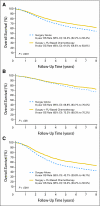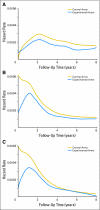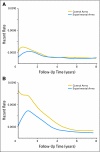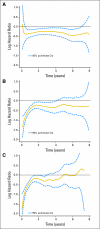Evidence for cure by adjuvant therapy in colon cancer: observations based on individual patient data from 20,898 patients on 18 randomized trials
- PMID: 19124803
- PMCID: PMC2738431
- DOI: 10.1200/JCO.2008.19.5362
Evidence for cure by adjuvant therapy in colon cancer: observations based on individual patient data from 20,898 patients on 18 randomized trials
Abstract
Purpose: Limited data are available on the time course of treatment failures (recurrence and/or death), the nature and duration of adjuvant treatment benefit, and long-term recurrence rates in patients with resected stage II and III colon cancer.
Methods: The data set assembled by the Adjuvant Colon Cancer Endpoints Group, a collection of individual patient data from 18 trials and more than 20,800 patients testing fluorouracil-based adjuvant therapy in patients with stage II or III colon cancer, was analyzed.
Results: A significant overall survival (OS) benefit of adjuvant therapy was consistent over the 8-year follow-up period. The risk of recurrence in patients treated with adjuvant chemotherapy never exceeds that of control patients, signifying that adjuvant therapy cures some patients, as opposed to delaying recurrence. After 5 years, recurrence rates were less than 1.5% per year, and after 8 years, they were less than 0.5% per year. Significant disease-free survival (DFS) benefit from adjuvant chemotherapy was observed in the first 2 years. After 2 years, DFS rates in treated and control patients were not significantly different, and after 4 years, no trend toward benefit was demonstrated. This benefit was primarily driven by patients with stage III disease.
Conclusion: Adjuvant chemotherapy provides significant DFS benefit, primarily by reducing the recurrence rate, within the first 2 years of adjuvant therapy with some benefit in years 3 to 4, translating into long-term OS benefit. This reflects the curative role of chemotherapy in the adjuvant setting. After 5 years, recurrence rates in patients treated on clinical trials are low, and after 8 years, they are minimal; thus, long-term follow-up for recurrence is of little value.
Conflict of interest statement
Authors' disclosures of potential conflicts of interest and author contributions are found at the end of this article.
Figures





References
-
- Moertel CG, Fleming TR, Macdonald JS, et al. Levamisole and fluorouracil for adjuvant therapy of resected colon carcinoma. N Engl J Med. 1990;322:352–358. - PubMed
-
- Wolmark N, Rockette H, Mamounas EP, et al. Clinical trial to assess the relative efficacy of fluorouracil and leucovorin, fluorouracil and levamisole, and fluorouracil, leucovorin, and levamisole in patients with Dukes' B and C carcinoma of the colon: Results from National Surgical Adjuvant Breast and Bowel Project C-04. J Clin Oncol. 1999;17:3553–3559. - PubMed
-
- Wolmark N, Rockette H, Fisher B, et al. The benefit of leucovorin-modulated fluorouracil as postoperative adjuvant therapy for primary colon cancer: Results from National Surgical Adjuvant Breast and Bowel Project protocol C-03. J Clin Oncol. 1993;11:1879–1887. - PubMed
-
- O'Connell MJ, Laurie JA, Kahn M, et al. Prospectively randomized trial of postoperative adjuvant chemotherapy in patients with high-risk colon cancer. J Clin Oncol. 1998;16:295–300. - PubMed
-
- André T, Boni C, Mounedji-Boudiaf L, et al. Oxaliplatin, 5-fluorouracil, and leucovorin as adjuvant treatment for colon cancer. N Engl J Med. 2004;350:2343–2351. - PubMed
Publication types
MeSH terms
Substances
Grants and funding
LinkOut - more resources
Full Text Sources
Other Literature Sources

